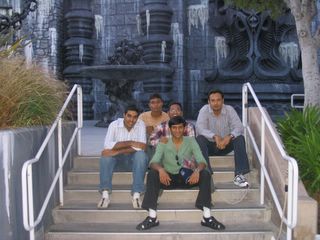PAUL KRUGMAN IS ON VACATION. (NYT - 3rd June)
By THOMAS L. FRIEDMAN
It was extremely revealing traveling from Europe to India as French voters (and now Dutch ones) were rejecting the E.U. constitution - in one giant snub to President Jacques Chirac, European integration, immigration, Turkish membership in the E.U. and all the forces of globalization eating away at Europe's welfare states. It is interesting because French voters are trying to preserve a 35-hour work week in a world where Indian engineers are ready to work a 35-hour day. Good luck.
Voters in "old Europe" - France, Germany, the Netherlands and Italy - seem to be saying to their leaders: stop the world, we want to get off; while voters in India have been telling their leaders: stop the world and build us a stepstool, we want to get on. I feel sorry for Western European blue collar workers. A world of benefits they have known for 50 years is coming apart, and their governments don't seem to have a strategy for coping.
One reason French voters turned down the E.U. constitution was rampant fears of "Polish plumbers." Rumors that low-cost immigrant plumbers from Poland were taking over the French plumbing trade became a rallying symbol for anti-E.U. constitution forces. A few weeks ago Franz Müntefering, chairman of Germany's Social Democratic Party, compared private equity firms - which buy up failing businesses, downsize them and then sell them - to a "swarm of locusts."
The fact that a top German politician has resorted to attacking capitalism to win votes tells you just how explosive the next decade in Western Europe could be, as some of these aging, inflexible economies - which have grown used to six-week vacations and unemployment insurance that is almost as good as having a job - become more intimately integrated with Eastern Europe, India and China in a flattening world.
To appreciate just how explosive, come to Bangalore, India, the outsourcing capital of the world. The dirty little secret is that India is taking work from Europe or America not simply because of low wages. It is also because Indians are ready to work harder and can do anything from answering your phone to designing your next airplane or car. They are not racing us to the bottom. They are racing us to the top.
Indeed, there is a huge famine breaking out all over India today, an incredible hunger. But it is not for food. It is a hunger for opportunity that has been pent up like volcanic lava under four decades of socialism, and it's now just bursting out with India's young generation.
"India is the oldest civilization, the largest democracy and the youngest population - almost 70 percent is below age 35 and almost 50 percent is 25 and under," said Shekhar Gupta, editor of The Indian Express. Next to India, Western Europe looks like an assisted-living facility with Turkish nurses.
Sure, a huge portion of India still lives in wretched slums or villages, but more and more of the young cohort are grasping for something better. A grass-roots movement is now spreading, demanding that English be taught in state schools - where 85 percent of children go - beginning in first grade, not fourth grade. "What's new is where this movement is coming from," said the Indian commentator Krishna Prasad. "It's coming from the farmers and the Dalits, the lowest groups in society." Even the poor have been to the cities enough to know that English is now the key to a tech-sector job, and they want their kids to have those opportunities.
The Indian state of West Bengal has the oldest elected Communist government left in the world today. Some global technology firms recently were looking at outsourcing there, but told the Communists they could not do so because of the possibility of worker strikes that might disrupt the business processes of the companies they work for. No problem. The Communist government declared information technology work an "essential service," making it illegal for those workers to strike. Have a nice day.
"This is not about wages at all - the whole wage differential thing is going to reduce very quickly," said Rajesh Rao, who heads the innovative Indian game company, Dhruva. It is about people who have been starving "finally seeing the ability to realize their dreams." Both Infosys and Wipro, India's leading technology firms, received more than one million applications last year for a little more than 10,000 job openings.Yes, this is a bad time for France and friends to lose their appetite for hard work - just when India, China and Poland are rediscovering theirs.






